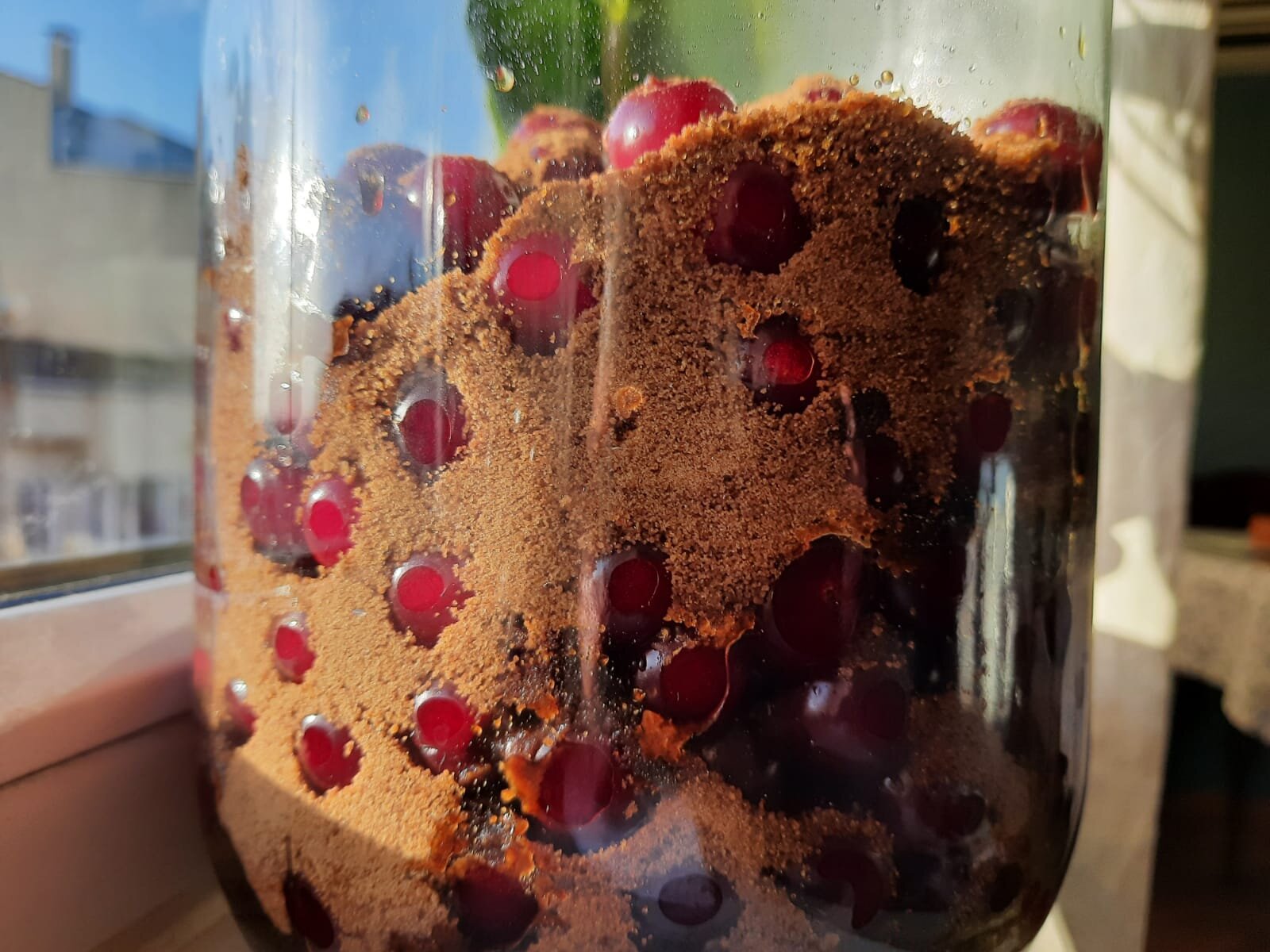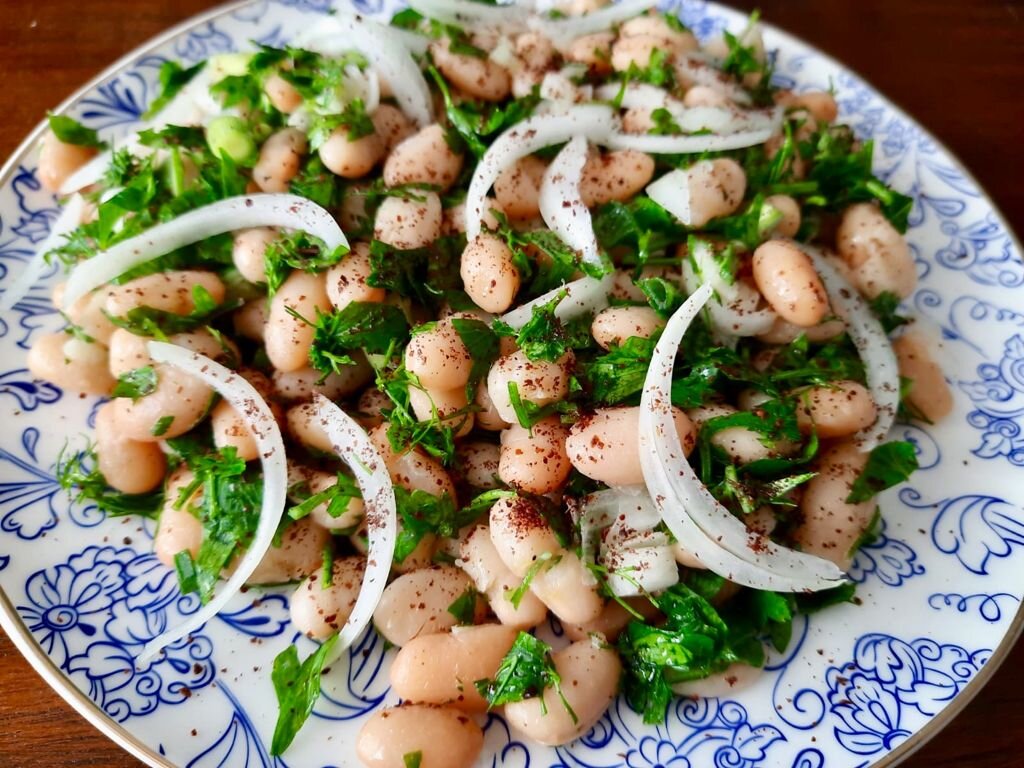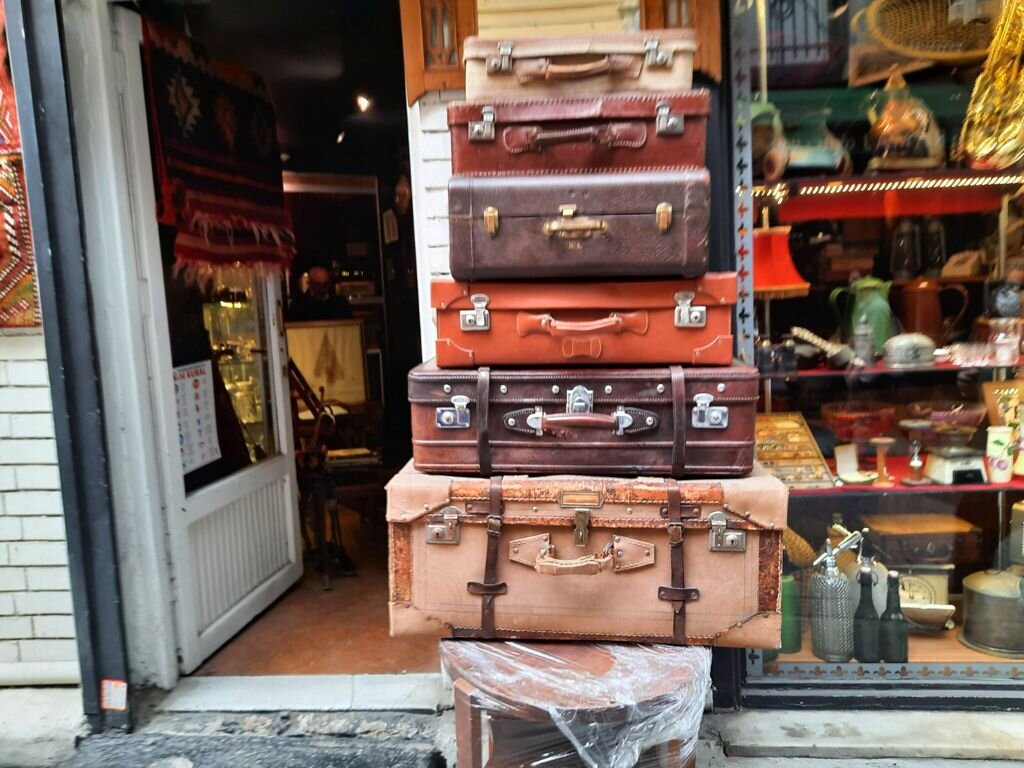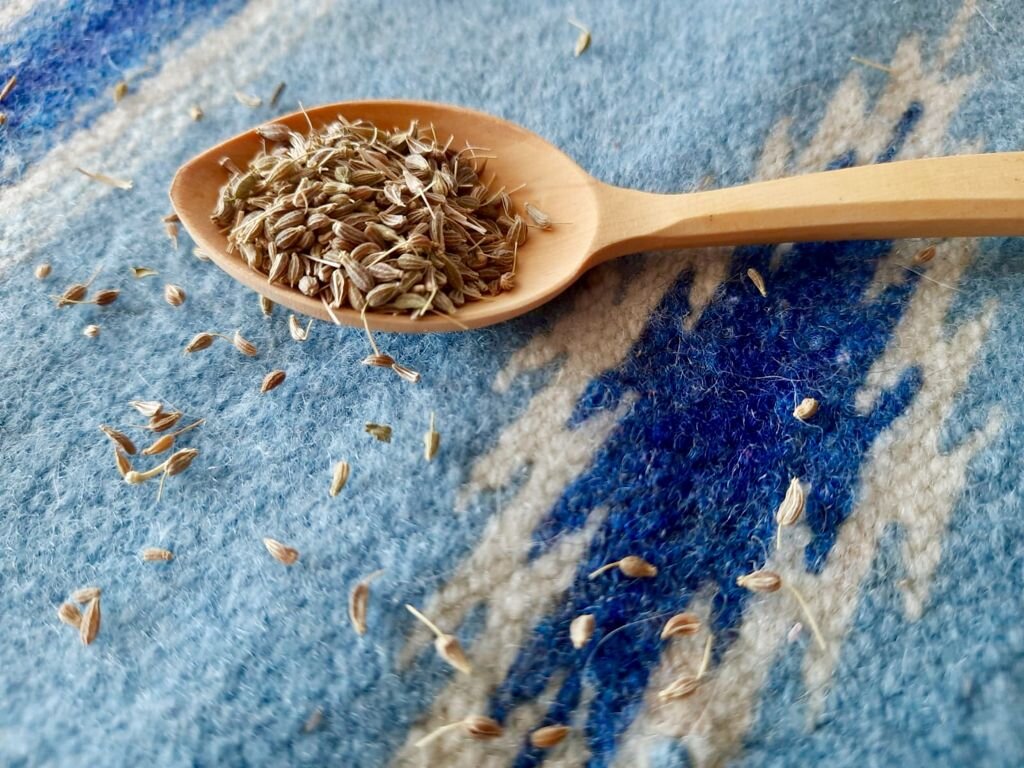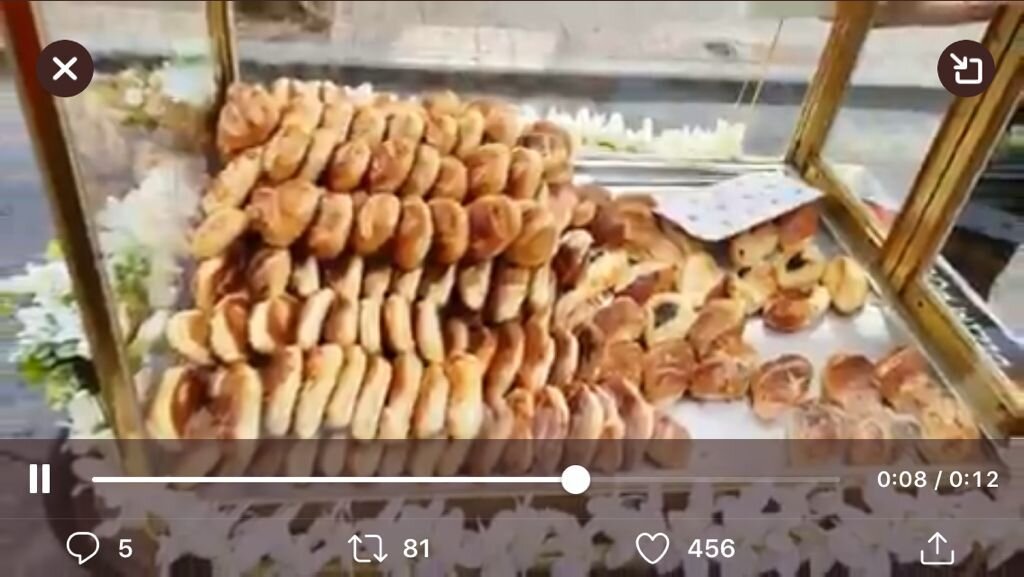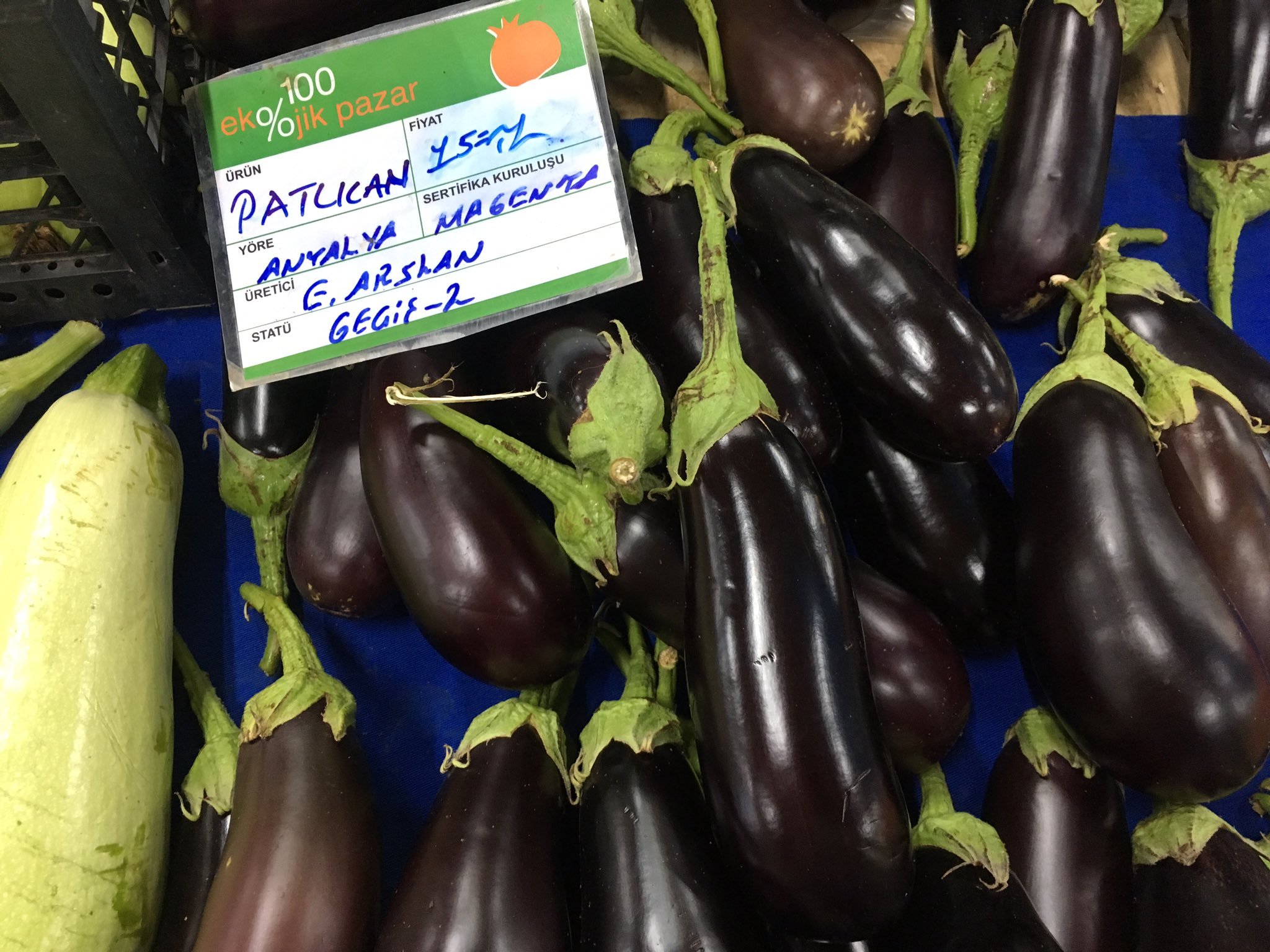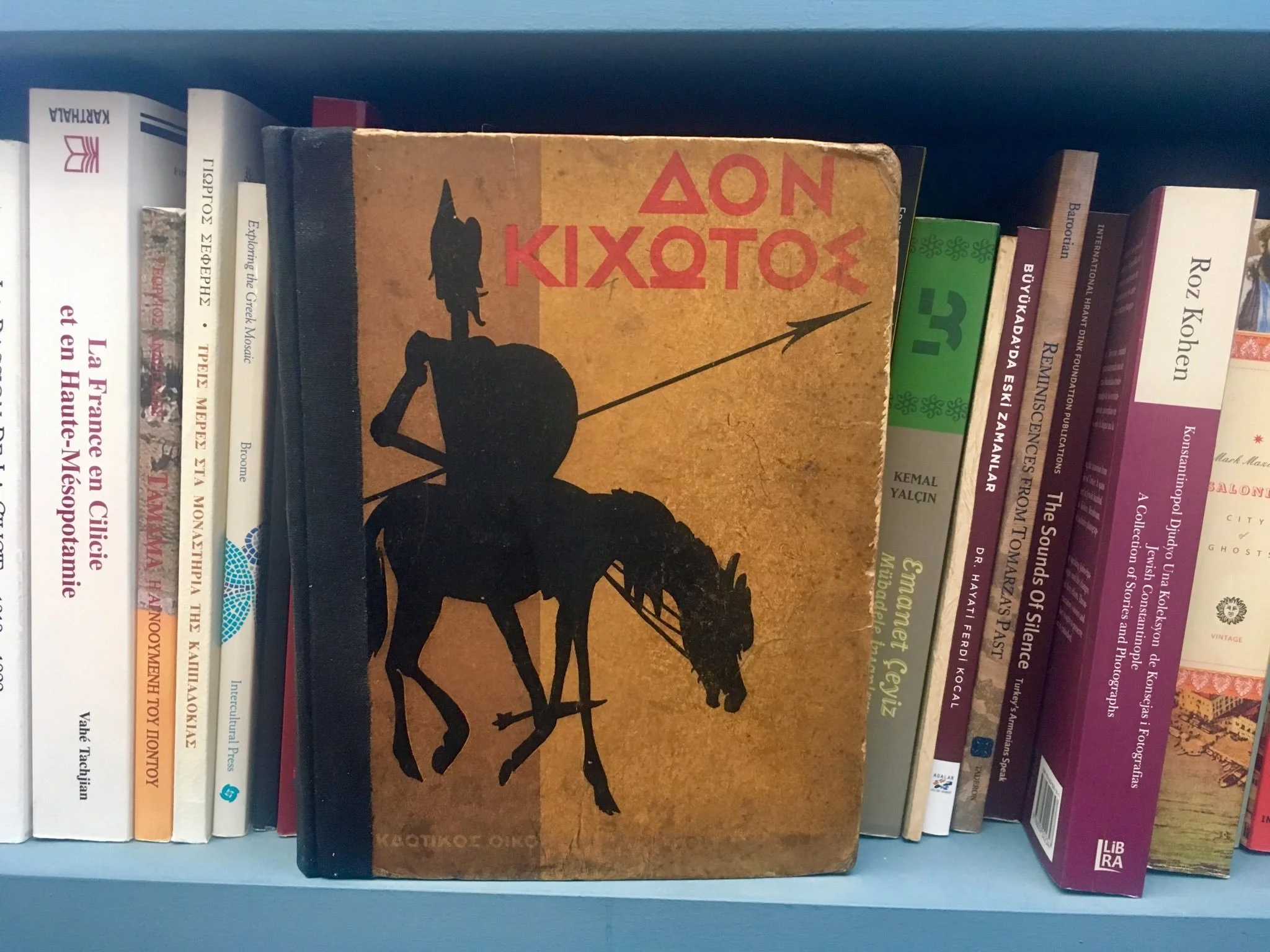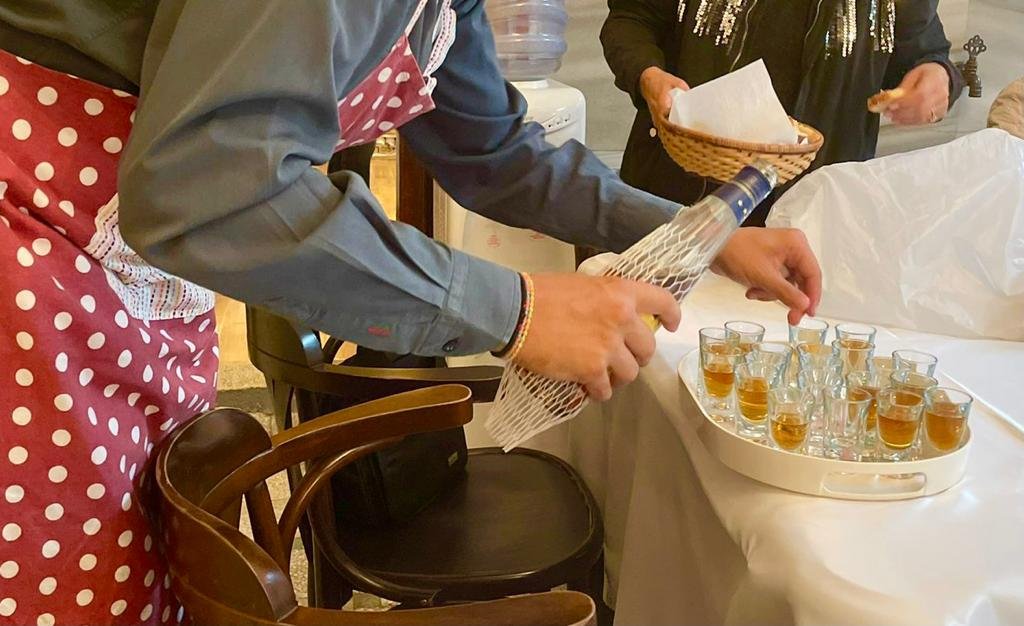Polítika/Πολίτικα/Istanbul Greek
σαλκίμι/salkími
Istanbul Greek Idiom #1: Whereas wisteria is called γλυσίνα/glysina in Athens, in Istanbul (as well as in many parts of Greece outside Athens), we call it σαλκίμι/salkími, borrowed from the Turkish salkım.
κεντιανό/kendianó
Istanbul Greek Idiom #2: Whereas the Athenian word for snack is κολατσιό/kolatsio (from the Italian colazione, meaning breakfast), in Istanbul we call our afternoon snack κεντιανό/kendianó, because it is eaten near the time of the Muslim Turkish ikindi prayer. The afternoon is likewise called κεντί/kendí.
Κουλάς/Koulás
Istanbul Greek Idiom #3: The Galata Tower is the Πύργος του Γαλατά/Pyrgos tou Galata for Greeks, but for us it is simply the Κουλάς/Koulás, from the Turkish kule. Ladino also uses the same word, Kula, for the monument of this traditionally Jewish neighbourhood.
νταλγκάς/dalgás
Istanbul Greek Idiom #4: Dalga means wave, temporary love affair, and reverie in Turkish; in Istanbul Greek, νταλγκάς/dalgas means wave or obsession; in Greece, the same word (but sometimes spelled νταλκάς/dalkas) is used for longing and unrequited love.
νάτο κεφάλι νάτο μερμέρι/nato kafa nato mermer
Istanbul Greek Idiom #5: An expression that I use daily for my stubborn Karadenizli husband is νάτο κεφάλι νάτο μερμέρι, which passed into Turkish as nato kafa nato mermer. Literally: "here is the head, here is the marble."
κουμάσι/kumási
Istanbul Greek Idiom #6: the word κουμάσι/kumási creates confusion in Greece, where it is used for both chicken coops and crooks. In Istanbul, we know that they come from two different Turkish words: kümes for coop and kumaş for cloth (a crook is made from bad cloth/material).
τράχωμα/tráhoma
Istanbul Greek Idiom #7: Τράχωμα/tráhoma means dowry in our idiom. It is a Byzantine Greek word that passed into Turkish & Ladino as drahoma. In Greece, however, the "dowry" meaning has been forgotten; and its homonym τράχωμα/trachoma refers to the eye disease trachoma.
Αρμένικη βίζιτα/Arméniki vízita
Istanbul Greek Idiom #8: Αρμένικη βίζιτα/Arméniki vízita/Armenian visit is what we call the situation where the guests stay too long and don't seem to have any intention of leaving. I'll let my Armenian friends explain why.
σικτίρ πιλάφι/siktír piláfi
Istanbul Greek Idiom #9: Σικτίρ πιλάφι/siktír piláfi (f%@#-off pilav) is the last treat that you serve when you are tired of your guests and want to hint that they should leave. In the past, a sweet rice pilav was served to guests at Rum weddings as a sign that the party was over.
καβάφης/kaváfis
Istanbul Greek Idiom #10: Καβάφης/kaváfis, famous as the surname of the great poet Cavafy, is the Istanbul Greek word for a cobbler of second-rate shoes or for a person who does shoddy work (loan from Turkish word kavaf). Alas, not a fitting surname for the perfectionist poet.
αγιάζι/ayázi
Istanbul Greek Idiom #11: Αγιάζι/ayázi: humid, piercing cold, especially on winter nights & early mornings (from the Turkish ayaz, which refers to dry cold). Although used in Greece as well, there is no place like Istanbul to understand the true meaning of ayazi.
σαρδελιά/sardeliá
Istanbul Greek Idiom #12: Geranium (γεράνι/yeráni in Greece) is σαρδελιά/sarδeliá in Istanbul & Cretan Greek, τσαρτελλούιν/tsartellouin in Cypriot Greek and sardunya in Turkish. The word may have Greek origin and some connection with the Ancient city of Sardis (modern Sart).
σαρμασίκι/
sarmasíki
Istanbul Greek Idiom #13: Ivy, called κισσός/kissós in Greece, is σαρμασίκι/sarmasíki in Istanbul, from the Turkish sarmaşık. Sarmasiki is also the name of a nearly forgotten Rum parish/neighborhood south of Edirnekapı. (In photo: sarmasiki in our dear Yeniköy/Νιχώρι).
ντρίτος/drítos, ακατρεπάγκλ/à quatres épingles, τρίγκα/trínga
Istanbul Greek Idiom #14: Dressing well is traditionally important in Rum culture & evidenced by the many words we have for "dressed to the nines," including ντρίτος (from Italian diritto), ακατρεπάγκλ (from French à quatres épingles) τρίγκα/tringa (possibly from French fringué).
σκόρδα/skorδa
Istanbul Greek Idiom #15: When you've done something commendable or are just looking fabulous and we don't want to give you the evil eye, we say σκόρδα/skorδa/garlic! Or σκόρδα νά 'χεις! May you have garlic! Which will of course avert the evil eye.
μάνι-μάνι/mani-mani
Istanbul Greek Idiom #16: Μάνι-μάνι/mani-mani is a favorite Istanbul adverb, used sometimes also in Greece, meaning "quickly" (from Italian mena le mani). In the video, the guys at the Mehmet Efendi counter in Eminönü wrap freshly ground coffee μάνι-μάνι/mani-mani.
Πόλη/Póli
Istanbul Greek Idiom #17: Formerly Byzantium, New Rome, Constantinoupolis, Kostantiniyye; today Istanbul; but if you ask an Istanbul Rum where he is from, he will reply "the Πόλη/Poli/City" because there is only One and no others compare.
Ρωμιός/Romiós (m) Ρωμέισσα/
Roméissa (f)
Istanbul Greek Idiom #17: Ρωμιός/Romios (m) Ρωμέισσα/Romeissa (f) was a citizen of the Byzantine Emp. & an Orthodox Christian of the Ottoman Emp.; today an Orthodox Christian of Turkey (Rum in Turkish). The community's traditional mother tongue is Greek. Photo: Fener Rum Lycée
χουλιάρι/houliári
Istanbul Greek Idiom #18: Our word for spoon is χουλιάρι/houliári from κοχλιάριον/kohliarion (some early spoons were shells -κοχλίας/kohlias- with handles). The word exists in Greece but is rarely used; Istanbul Greek, however, preserves the original Byzantine usage.
φάλι/fali
Istanbul Greek Idiom #20: Φάλι/fali is augury, most commonly practiced with coffee grounds (both those left in the cup after drinking and those that end up in the saucer after turning the cup). From the Arabic "fal" for omen, which passed into both Turkish and Greek as augury.
εγκινάρα/enginara
Istanbul Greek Idiom #21: Called αγκινάρες αλά Πολίτα/angináres à la Polita in Greece and εγκινάρες/engináres here in Istanbul, where everything is à la Polita. From the Byzantine word αγκινάρα/anginara, which passed into Turkish as enginar and ping-ponged back to us as εγκινάρα/enginara.
κουντουράς/kundurás
Istanbul Greek Idiom #22: In Greece the shoemaker is τσαγκάρης/tsaŋgáris (from Persian), while in Istanbul Greek it is κουντουράς/kundurás or κουντουρατζής/kunduratzís from the Byzantine κούντουρα/kúndura (shoes). Turkish also uses the Byzantine words kundura & kunduracı.
μνίσκω/mnísko
Istanbul Greek Idiom #23: "Where do you live?" is not "πού μένεις;/pú ménis?" as in Greece, but " πού μνίσκεις;/pú mnískis?" The Byzantine verb μνίσκω is a derivative of μένω and is used for long-term living/inhabiting (μένω, on the other hand, is used for short term staying).
πάστρα/pástra
Istanbul Greek Idiom #24: Πάστρα/pástra=housecleaning; παστρεύω/pastrévo=to clean; παστρικιά/pastrikiá=clean woman. All come from the word σπάρτo/spárto/spartium junceum, from which brooms where made. Note: pastrikiá can mean prostitute (because good girls don't shower too much).
γιαλί/yalí
Whatever it is, the way you tell your story online can Istanbul Greek Idiom #25: Α mansion on the shores of the Bosporus is called γιαλί/yalí. The word descends from the Ancient Greek αιγιαλός/eyialós (seashore) and has passed into Turkish as yalı. Photo: Tophane Müşiri Zeki Paşa Yalısı in Rumeli Hisarı.
τακτάκι/taktáki
Istanbul Greek Idiom #26: A door knocker in Greece is ρόπτρο/róptro, but in Istanbul Greek it is τακτάκι/taktáki, an onomatopoeia of the sound (tak-tak) that the knocker makes. Photo: the door of an 18th-century Levantine köşk on the Bosporus.
τζίβα/tzíva
Istanbul Greek Idiom #27: Τζίβα/tzíva is another name for σπάρτος/spartium junceum, from which brooms were made (see below yellow flowers on a Nişantaşı sidewalk). The word remained in our idiom with the meaning "very clean." Ex: Θα το κάμω τζίβα= I will make it sparkly clean.
σιμίτι/simíti
Istanbul Greek Idiom #28: The bread ring called κουλούρι/kouloúri in Greece is a σιμίτι/simíti in Istanbul. Simíti may have Persian roots (passed into Turkish as simit), but a more likely possibility is the Ancient Greek σησαμίτης/sisamítis, a sesame-covered bread.
τζαντόγρια/
tzadógria
Istanbul Greek Idiom #29: Τζαντόγρια/tzadógria is one of my favourite Turkish-Greek hybridisms, from the Turkish cadı (witch) and the Greek γριά/griá (old woman), a combination that means "nasty old woman."
φαγιάνς/fayiáns
Istanbul Greek Idiom #30: Φαγιάνς/fayiáns is the word we use for ceramic tile (called πλακάκια/plakákia in Greece). The word passed into Turkish (as fayans) and Istanbul Greek through French, but its roots are in Faenza, Italy, famous for its glazed pottery.
σεβντάς/sevdás
Istanbul Greek Idiom #31: Σεβντάς/sevdás is one of those magical Arabic words that passed into both Turkish (as sevda) & Greek. It means passionate love, often ill-fated or melancholy. Its extreme version is καρασεβντάς/karasevdás, black sevda, a Turko-Arabic hybridism.
τεντζερές/
tendzerés
Istanbul Greek Idiom #32: Although Greece borrowed its word for cooking pot, κατσαρόλα/katsaróla, from the Venetian cazzarola, in Istanbul we use τεντζερές/tendzerés, a word which came into Turkish (tencere) and Istanbul Greek through Persian and/or Arabic.
προσόψι/prosópsi πεσκίρι/peskíri πεστεμάλι/
pestemáli
Istanbul Greek Idiom #33: While πετσέτα/petséta is a towel in Greece (Italian pezzeta), in Istanbul we also use the more old-fashioned προσόψι/prosópsi (Medieval Greek), as well as πεσκίρι/peskíri or πεστεμάλι/pestemáli for hamam towels (from Persian through Turkish).
γιαπράκια/
yaprákia
Istanbul Greek Idiom #34: In Greece, γιαπράκια/yaprákia are meat-stuffed grape or cabbage leaves w/ lemon-egg sauce; in Istanbul, γιαπράκι/yapráki is a grape leaf or a sheet of paper. From the Turkish word yaprak, which is any kind of leaf or sheet of paper.
ρεντές/rendés
Istanbul Greek Idiom #35: In most of Greece a grater is called a τρίφτης/tríftis, but in Istanbul we call it a ρεντές/rendés (from Persian through Turkish). Instead of the verb τρίβω/trívo (when used for grating), we say κάμνω ρεντέ/kámno rendé.
κιτάπι/kitápi
Istanbul Greek Idiom #36: Κιτάπι/kitápi means book in Istanbul Greek (from Arabic kitab through Turkish kitap). In Greece the same word exists, but with a more specific meaning: record, log or account book or archive.
ντούτια/dútia
Istanbul Greek Idiom #37: Mulberries (& generic berries) are μούρα/moúra in Greece; in Istanbul they are ντούτια/dútia, from Arabic tut through Turkish dut. One of the great pleasures of Istanbul in June, as long as you don't slip on those fallen from trees.
μαϊντανός/
maïndanós
Istanbul Greek Idiom #38: Parsely in Ancient Greek was πετροσέλινο/petrosélino, but because it flourished in Macedonia, it became known as μακεδονήσιον/makedonísion. The word was borrowed into Turkish as maydanoz & reborrowed into Greek (Istanbul & Greece) as μαϊντανός/maïndanós.
μπογιατζής/
boyadzís
Istanbul Greek Idiom #39: We call a shoeshiner (or wall painter) a μπογιατζής/boyadzís (from Turkish boyacı). Λούστρος/loústros, the word used in Greece, fell out of use when the Greeks took to shining their own shoes. Ιn Istanbul, however, the boyadzís lives on.
εβραίικα αυγά/evréïka avgá
Istanbul Greek Idiom #40: Huevos haminados-eggs boiled all night until they brown-are a traditional Sephardic Shabbat dish. The Rum neighbours of the Jews who cooked huevos haminados came to call all overboiled eggs εβραίικα αυγά/evréika avgá: Jewish eggs. Term still used today.
σεμιζότι/semizóti
Istanbul Greek Idiom #41: Σεμιζότι/semizóti (from the Turkish semizotu) is another Istanbul delight in June, especially as salad with yoghurt and garlic sauce. It is called γλιστρίδα/glistrídha in Greece, where it is comparatively overlooked (except by Pontian grandmas).
τσατάλι/tsatáli
Istanbul Greek Idiom #42: Τσατάλι/tsatáli is a slingshot (from Turkish çatal, which today means fork but used to mean pitchfork or an object in a Y-shape). Τσατάλα/tsatála is used in Northern Greece for slingshot; in Southern Greece, they are σφεντόνες/sfendónes.
καΐσια/kaísia
Istanbul Greek Idiom #43: A fruit with a tangled past. Called βερίκοκα/veríkoka in Greece (related to Latin/Greek praecocia/πραικόκια which passed into Arabic as berkuk & then on to Europe); called simply καΐσια/kaísia in Istanbul (from Arabic kaysi through Turkish kayısı).
νανές/nanés
Istanbul Greek Idiom #44: In Istanbul we use the musical word νανές/nanés, from Arabic nana through Turkish nane, for spearmint; in Greece δυόσμος/diósmos, from Ancient ηδύοσμος/idíosmos, meaning "that which smells sweetly"... especially at the pazar on a rainy Istanbul morning.
ρεγάλο/regálo
Istanbul Greek Idiom #45: While in Greece a gift is a δώρο/dóro, in Istanbul we call it a ρεγάλο/regálo, from the Italian. Photo: the best regalo of all, fresh rose jam.
μισίρι/misíri
Istanbul Greek Idiom #46: We call corn μισίρι/misíri, from Arabic Miṣr through Turkish Mısır, meaning "Egypt" (corn was referred to as Egyptian wheat). Greece uses the Albanian-rooted word καλαμπόκι/kalambóki, but its official name is αραβόσιτος/aravósitos, meaning Arab wheat.
κεπέγκια/kepéngia
Istanbul Greek Idiom #47: We call roll-down shutters κεπέγκια/kepéngia, from Turkish kepenk (in Greece ρολά/rolá from Venetian rolo). Κατεβάζω κεπέγκια/katevázo kepéngia ("I lower the shutters") means to go bankrupt...which fortunately has not happened to this place.
καλντερίμι/
kalderími
Istanbul Greek Idiom #48: Cobblestone is καλντερίμι/kalderími, from Turkish kaldırım. We also use the Turko-Arabic hybrid καλντερίμ μουχεντίσης/kaldirím mouhendísis (kaldırım mühendisi/sidewalk engineer) for loafers and idlers.
μάσκαρα/máskara
Istanbul Greek Idiom #49: While in Greece mask is μάσκα/máska from Italian masca, in Istanbul it is μάσκαρα/máskara from Ladino maskara (in Greece, however, μάσκαρα/máskara is the eyelash cosmetic).
καλέμι/kalémi
Istanbul Greek Idiom #50: Τhe Greeks reborrowed στυλός/stylós from the French who borrowed Greek στυλογράφος/stylοgráfos, but we use the Mediterranean traveller καλέμι/kalémi from Turkish kalem, from Arabic kalam, from Ancient Greek κάλαμος/kálamos.
τσουμπούσι/ tsoumboúsi
Istanbul Greek Idiom #54: Τσουμπούσι/ tsoumboúsi (pronounced τσιμπούσι/tsimboúsi in Greece) is a party with plenty of food & sometimes song & dance. Most likely from Ancient Greek συμπόσιο/sympósio (Turkish çümbüş & Persian cunbīş from same).
Photo: Yeniköy Panayia
φαγί/fayí, φαγιά/fayiá
Istanbul Greek Idiom #52: Whereas in Greece the most common word for food is φαγητό/fayitó, we use the word φαγί/fayí, plural φαγιά/fayiá.
Photo: Τα φαγιά/ta fayiá prepared by the lovely ladies of Yeniköy Panayia for a community banquet in honour of the Ecumenical Patriarch Bartholomew.
τσαρσί/tsarsí
Istanbul Greek Idiom #53:While the τσαρσί/tsarsí to Greeks (at least those who have visited Istanbul) denotes the Grand Bazaar or Kapalıçarşı, for Istanbul Rums a τσαρσί/tsarsí is any street or neighbourhood with shops (from Turkish çarşı from Persian çārsū meaning crossroads).
καβανόζι/kavanózi
Istanbul Greek Idiom #54: Whereas Greece uses the word βάζο/vázo (from Italian vaso) for jar, we use καβανόζι/kavanózi (reborrowed from Turkish kavanoz, borrowed from Byzantine γάβενος/gávenos). Photo: this year's sour cherry (βύσσινο/vişne) liqueur brewing in a giant kavanózi.
όρνιθα/órnitha
Istanbul Greek Idiom #55: Live chickens are κότες/kótes but Greeks call slaughtered chicken κοτόπουλο/kotópoulo while we call it όρνιθα/órnitha or πουλί/poulí (latter: bird or male genitals in Greece). Confusion has arisen when Rum ladies have requested poulí at Athens butchers.
αραμπάς/arabás
Istanbul Greek Idiom #56: We call a horse-drawn carriage αραμπάς/arabás (from Turkish araba). We use the Central Greek word for horse (άλογο/álogo), but we use the literary plural αλόγατα/alógata. Άτι/áti, war horse, entered Medieval Greek from Turkish at (horse).
γιαβρί/yiavrí
Istanbul Greek Idiom #57: We call a baby γιαβρί/yiavrí from Turkish yavru. In Greece you'll hear the term of endearment μωρό μου/moró mou, but in Istanbul we say γιαβρί μου/yiavrí mou.
Photo: Our yiavrí at three months old.
μπαχτσές/ bahtsés
Istanbul Greek Idiom #58: Whereas Central Greek usually uses the word κήπος/kípos for garden, we use μπαχτσές/ bahtsés, which we pronounce bah-chés (from Turkish bahçe from Persian bāġçe). Video: the bahchés of St. Dimitrios, Büyükada (Πρίγκηπος) this morning.
ντούζικο/dúziko
Istanbul Greek Idiom #59: We call the apéritif ouzo ντούζικο/doúziko. According to Dr. Matthew John Hadodo, the number 12 (douze in French) used to be written on boxes of the drink, thus the Franco-Greek name doúziko.
φασούλια/fasúlia
Istanbul Greek Idiom #60: Whereas Greece calls beans φασόλια/fasólia, we call them φασούλια/fasúlia (from Ancient Greek φάσηλος/fásilon or φασίολος/fasíolos). Our version of the word passed into Turkish as fasulye.
πιάζι/piázi
Istanbul Greek Idiom #61: Πιάζι/piázi (from Turkish piyaz from Persian piyaz, which means onion) is a typical Istanbul dish made from white beans, parsley, onion, salt and sometimes other herbs and boiled egg. In our dialect πιάζι/piázi also means flattery, as in Turkish.
γκιουμρούκι/giumrúki
Istanbul Greek Idiom #62: We call a customshouse γκιουμρούκι/giumrúki, from Turkish gümrük from Medieval Greek κουμμέρκιον/kummérkion (customshouse or customs duties in Byzantium) from Latin commercium (trade). Γιουμρούκι/giumrúki also means customs duties.
καραμφίλι/karamfíli
Istanbul Greek Idiom #63: Γαρύφαλλο/garyfallo in Central Greek, καραμφίλι/karamfíli in Istanbul Greek & karanfil in Turkish (all from Ancient καρυόφυλλον/karyófyllon) mean both clove & carnation. In Istanbul we also use μοσχοκάρφι/moshokárfi for clove, but not for carnation.
ανασόνι/anasóni
Istanbul Greek Idiom #64: We call anise ανασόνι/anasóni, from Ancient Greek άνισον/ánison. Central Greek's version of the word adds the prefix γλυκ/glyk to make γλυκάνισο/glykániso (sweet anise), while the Turkish version is closer to ours (and to the Ancient Greek): anason.
κιλίφι/kilífi
Istanbul Greek Idiom #65: Whereas pillowcase in Central Greek is μαξιλαροθήκη/maxilarothíki, we call it κιλίφι/kilífi, from Ancient Greek κελύφιον/kelyfion. Although some say that the Turkish word kılıf comes from Arabic, we believe that it also derives from κελύφιον/kelyfion.
μπουγάτσα/bougátsa
Istanbul Greek Idiom #66: Although Athenians use the word μπουγάτσα/bougátsa (from Turkish poğaça from Italian focaccia) for a sweet cream-filled pastry, we use it for savory pastries filled with cheese or meat.
Listen to the call of an Istanbul μπουγατσατζής/bougatsatzís
κόχη/kóhi
Istanbul Greek Idiom #67: A corner is γωνία/gonía in Central Greek, but in Istanbul we use the medieval word κόχη/kóhi (from Ancient Greek κόγχη/ kóghi, which meant corner, curve or niche). Photo: Serpuş Han in Galata, built in 18th-century on existing Genoese structure.
μπαντέμια/badémia
Istanbul Greek Idiom #68: We call almonds μπαντέμια/badémia, from Turkish badem from Persian badam; and we call ice μπούζι/búzi, from Turkish buz. Photo: Buzlu badem (iced almonds), a specialty of Istanbul meyhanes, accompanied by a glass of ντούζικο/dúziko (see #59).
Ίσιος Δρόμος/Ísios Δrómos
or
Μεγάλη Οδός/ Megáli Oδós
Istanbul Greek Idiom #69: The Cadde-i Kebir in Ottoman Turkish, the Grand Rue de Péra in French, İstiklal Caddesi in Modern Turkish, and the Ίσιος Δρόμος/Ísios Δrómos/Straight Road or Μεγάλη Οδός/ Megáli Oδós/Grand Street in Istanbul Greek.
Μιμάρης/mimáris (m)
or
μιμάρισσα/mimárissa (f)
Istanbul Greek Idiom #70: Μιμάρης/mimáris (m) or μιμάρισσα/mimárissa (f) is our word for architect (from Turkish mimar from Arabic معمار. Looking closely at Istanbul's heritage buildings, one finds that many were built by Rum μιμάρηδες/mimárides (plural).
τζούμπα/ʤúmba
Istanbul Greek Idiom #71: An oriel window, one of the most characteristic elements of Istanbul architecture, is called an εξώστης/eksóstis in Central Greek but a τζούμπα/ʤúmba in Istanbul Greek (from Turkish cumba, possibly from Italian gibbo). Photo: Halep Pasajı (Cité d’Alep)
ασλάνι/asláni
Istanbul Greek Idiom #72: Whereas lion in Central Greek is λεοντάρι/leondári, we use the word ασλάνι/asláni, from Turkish aslan. Aσλάνι/asláni is also a strong or brave person. Photo: Detail of bishop's throne at St. Dimitrios, Büyükada.
σεκλέτι/sekléti
Istanbul Greek Idiom #73: Σεκλέτι/sekléti means distress, sorrow or longing pain (from Turkish sıklet, meaning heaviness, from Arabic ثِقلة). We also have the verb σεκλεντίζομαι/seklendízome, which means to suffer, to be upset, or to be tortured.
σκάλα/skála
Istanbul Greek Idiom #74: A quay is αποβάθρα/apováthra in Central Greek but σκάλα/skála in Istanbul Greek. Both σκάλα/skála and the Turkish word iskele come from the Italian scala.
Photo: The σκάλα/scala/iskele of Bostancı.
ντεμίρι/demíri
Istanbul Greek Idiom #75: Iron is σίδερο/sídero in Central Greek but ντεμίρι/demíri in Istanbul Greek (from Turkish demir). Ντεμιρτζής/demirdzís is an ironmonger in Istanbul Greek; in Greece, the word survives as a common surname, along with Ντεμιρτζόγλου/Demirdzóglu.
απίδι/apíδi
Istanbul Greek Idiom #76: A pear is αχλάδι/ahláδi in Central Greek but απίδι/apíδi in Istanbul Greek (from Hellenistic ἀπίδιον/apíδion from Ancient ἄπιον/ápion).
ινάτι/ináti
Istanbul Greek Idiom #77: Obstinacy in Istanbul Greek is ινάτι/ináti (from Turkish inat from Arabic عناد). The word exists as γινάτι/yináti in Central Greek, but it is rarely used and close to being lost.
Watch the Video: doing ινάτια/inátia (plural) when it's time to come in from a walk.
δροσερά/δroserá
Istanbul Greek Idiom #78: We call cucumbers δροσερά/δroserá (meaning: cool) as a polite alternative to χιγιάρια/hiyiária (from Turkish hıyar from Persian خيار). Turkish also avoids the objectionable word hıyar, preferring salatalık instead. In Central Greek: αγγούρια/angúria.
ντεμλίδικο/demlíδiko
Istanbul Greek Idiom #79: We call tea brewed in a double pot (from Turkish demli from Perrsian دم, meaning breath). Ντεμλίδικο/demlíδiko also refers to strong tea. Using tea bags—as the Greeks do, especially when ill—is rare.
σεφταλιά/seftaliá
Istanbul Greek Idiom #80: Peaches are ροδάκινα/rodákina in Central Greek (from Hellenistic δωράκινον/dorákinon from Latin duracinum) but σεφταλιά/seftaliá in Istanbul Greek (from Turkish şeftali from Persian شفت آلو). In Pontian Greek, a ruddy person is called σέφτελον/séftelon.Whatever it is, the way you tell your story online can make all the difference.
καντάρι/kandári
Istanbul Greek Idiom #81: Καντάρι/kandári means scale (from Byzantine κεντηνάριον/kendinárion from Latin centenarium). Turkish kantar may descend directly from Byzantine kendinárion or from Arabic قنطار, which was also borrowed from kendinárion. The word is rare in Central Greek.
μαντζάνα/mantzana
Istanbul Greek Idiom #82: Arabs brought the eggplant (badinjan) to Byzantium, where it was renamed μαντζάνα/mantzana. In Istanbul we still use μαντζάνα/mantzana, as well as πατλιτζάνα/patlitzana, most likely through Turkish patlıcan. Central Greek uses μελιτζάνα/melitzana.
αχουντουντού/ahududú
Istanbul Greek Idiom #83: Aχουντουντού/ahududú in Istanbul Greek is a spiced liqueur made from raspberries. The fruit raspberry is ahududu in Turkish, φραμπουάζ/frambuáz (from French framboise) in Istanbul Greek, and σμέουρο/sméuro or φραμπουάζ/frambuáz in Central Greek.
χισάρι/hisári
Istanbul Greek Idiom #84: Κάστρο/kastro in Central Greek (from Latin castro) but χισάρι/hisári (from Turkish hisar from Arabic حصار ) or καλές/kalés (from Turkish kale from Arabic قلعة) in Istanbul Greek. Photo: Rumeli Hisarı on the Bosphorus
τζιέρι μου/tziéri mu
Istanbul Greek Idiom #85: Τζιέρι μου/tziéri mu is a favourite Istanbul term of endearment meaning something like “my insides.” It derives from Turkish ciğer, meaning liver or lungs (from Persian جگر) plus the Greek possessive μου. Video: το τζιέρι μου/to tziéri mu
ταράφι/taráfi
Istanbul Greek Idiom #86: Whereas Central Greek uses the word πλευρά/plevrá or μεριά/meriá to mean “side,” we use ταράφι/taráfi, from Turkish taraf from Arabic طرف . Ταράφι/taráfi can be a physical side, a side in a dispute, or the side of a family.
καφαλτί/kafaltí
Istanbul Greek Idiom #87: Καφαλτί/kafaltí in Istanbul Greek (from Turkish kahvaltı, the meal eaten with coffee) means a rich, satisfying breakfast.
κάρτα μπιάνκα/kárta biánka
Istanbul Greek Idiom #88: Carte blanche (complete discretion or authority) is λευκό χαρτί/lefkó hartí or εν λευκώ/en lefkó in Central Greek but (from Italian carta bianca) in Istanbul Greek.
σηκώνεται/sikónete
Istanbul Greek Idiom #88: Central Greek uses the verb αναχωρεί/anahorí when a bus or boat “departs,” but we use σηκώνεται/sikónete, which means both “gets up” & “departs.” Rum ladies have found themselves in embarrassing situations when using this verb at Greek bus stops.
κε/ke ντεμπαρκαντέρ/debarkadér
Istanbul Greek Idiom #90: The seafront or quay is προκυμαία/prokiméa in Central Greek but κε/ke (from French quai) or ντεμπαρκαντέρ/debarkadér (from French débarcadère) in Istanbul Greek. It was the place to promenade, see, and be seen. Photo: the κε/ke of Büyükada
ντεφτέρι/deftéri
Istanbul Greek Idiom #91: Τετράδιο/tetráδio in Central Greek but ντεφτέρι/deftéri in Istanbul Greek, a word reborrowed from Turkish defter from Arabic دفتر from Ancient Greek διφθέρα/δifthéra.
Photo: the ντεφτέρια/deftéria in which I note old Polítika words and expressions.
καβούνι/kavúni
Istanbul Greek Idiom #92: (from Turkish kavun) is melon, while καβούν καφαλής/kavun kafalis is someone who has a head like a melon (literally or figuratively). Photo: the Persian καβούνια/kavúnia (on right) that one eats sliced with white cheese & raki @ meyhanes.
αλαμπρατσέτα/alabratséta
Istanbul Greek Idiom #93: Whereas Central Greek uses αγκαζέ/angazé from French engagé for arm in arm, Istanbul Greek also uses αλαμπρατσέτα/alabratséta from Italian a braccetto.
αναχτάρι/anahtári
Istanbul Greek Idiom #94: We have two words for key: κλειδί/klidí (also used in Central Greek) and αναχτάρι/anahtári, from Medieval Greek ανοικτήριον/aniktírion. The Turkish word anahtar also descends from ανοικτήριον/aniktírion.
μπαχτσές με τα λουλούδια/bahçés me ta lulúδia
Istanbul Greek Idiom #95: A particularly lovely person is called a μπαχτσές με τα λουλούδια/bahçés me ta lulúδia, meaning “garden with the flowers.”
See #58 for more on the word μπαχτσές/bahçés.
σοκολάτα/sokoláta
Istanbul Greek Idiom #96: Whereas chocolate is σοκολάτα/sokoláta in Central Greek, it is τσικολάτα/çikoláta in Istanbul Greek and çikolata in Turkish. All descend from Italian cioccolata from Spanish chocolate from Nahuatl xocolatl.
ντεφό/defó
Istanbul Greek Idiom #97: A flaw or fault is an ελάττωμα/elátoma in Central Greek but also a ντεφό/defó in Istanbul Greek (from French défaut). Photo: 1932 Athenian edition of Don Quixote, which has a fault on the cover title (but not inside). Can you spot the ντεφό/defó?
ηύρα/ívra
Istanbul Greek Idiom #96: In Central Greek the simple past of the verb βρίσκω/vrísko (I find) is βρήκα, but in Istanbul Greek it is ηύρα/ívra, just as in Cavafy’s work and closer to the form ηύρον/ívron that was used by the bard Homer. Below: Cavafy’s “Days of 1903”
χαβούζα/havúza
Istanbul Greek Idiom #97: Α pool is πισίνα/pisína in Central Greek (from Italian piscina) but χαβούζα/havúza in Istanbul Greek (from Turkish havuz from Arabic حوض ). Photo: the χαβούζα/havúza at the Büyükada Splendid Hotel, historically frequented by many from the Rum Community.
ταβάς/tavás
Istanbul Greek Idiom #98: A frying pan is a τηγάνι/tigáni in Central Greek but a ταβάς/tavás in Istanbul Greek (from Turkish tava from Persian تابهه ). Photo: lamb κεφτέδες/köfte with onion, cumin, turmeric, and oregano.
μπερζέρα/berjéra
φοτέι/fotéi
Istanbul Greek Idiom #99: An armchair is a πολυθρόνα/polithróna or μπερζέρα/berjéra in Central Greek and also a φοτέι/fotéi in Istanbul Greek (from French fauteuille).
ζακέτο/zakéto
Istanbul Greek Idiom #100: A suit jacket is a σακάκι/sakáki in Central Greek (from σάκος/sákos, a garment worn by Byzantine Emperors) but a ζακέτο/zakéto in Istanbul Greek (from French jaquette, possibly from Byzantine σάκος/sákos). Zακέτα/zakéta in Central Gk is a cardigan.
τσινάρι/tsinári/çinári
WIstanbul Greek Idiom #101: A plane tree is a πλάτανος/plátanos in Central Greek but a τσινάρι/tsinári/çinári in Istanbul Greek (from Turkish çınar from Persian چنال ). Tσινάρι/Tsinári is a also neighborhood in Thessaloniki inhabited, until 1923, by Muslims and Islamicized Jews.
τσιβί/tsiví/çiví
Istanbul Greek Idiom #102: A nail is a καρφί/karfí in Central Greek but a τσιβί/tsiví/çiví in Istanbul Greek (from Turkish çivi). Έφαγα τσιβί/éfaga tsiví/I ate a tsiví in Central Greek means -to put it politely-“I received a disagreeable thing,” such as a parking ticket, etc.
κομμάτι/kommáti
Istanbul Greek Idiom #103: Greeks tease Istanbul Rums about the word κομμάτι/kommáti, which means piece in Central Greek but both piece and "a little" in Istanbul Gk (λίγο/lígo is "a little" in Central Gk). Perhaps we should re-read Cavafy's "Myres: Alexandria in 340 A.D."?
τσιμένι/tsiméni
Istanbul Greek Idiom #104: Τσιμένι/tsiméni (from Turkish çemen from Persian چمن ) refers to the herb, pepper, and garlic mixture that covers pastırma. Τσιμένι/tsiméni (from Turkish çimen) also means grass in Istanbul Greek.
σπίρτο/spirto
Istanbul Greek Idiom #105: Rubbing alcohol is called οινόπνευμα/inópnevma in Central Greek (from οινο-/íno-/wine + πνεύμα/pnévma/spirit, a loanword translated from French esprit-de-vin), but σπίρτο/spirto in Istanbul Greek (from Italian spirito).
κιμπρίτι/kibríti
Istanbul Greek Idiom #106: A matchstick is σπίρτο/spírto (from Italian spirito) in Central Greek, but κιμπρίτι/kibríti in Istanbul Greek (from Turkish kibrit from Arabic كِبْرِيت). See #105 for σπίρτο/spírto in Istanbul Greek.
Πέρα/Péra
Istanbul Greek Idiom #107: The area of Istanbul now called Beyoğlu was formerly called Πέρα/Péra (meaning beyond or “over there”) because it lies on the opposite side of the Golden Horn from the old city. The word survives in business names, including the Pera Palace Hotel.
κιουρντάν/kiurdán
Istanbul Greek Idiom #108: A toothpick is an οδοντογλυφίδα/oδondoglifída in Central Greek (a translated loan from German Zahnstocher) but a κιουρντάν/kiurdán in Istanbul Greek (from French cure-dent).
τζουζντάνι/dʒuzdáni πορτμονέ/portmoné
Istanbul Greek Idiom #109: Α wallet is a πορτοφόλι/portofóli (from Italian portafoglio) in Central Greek. In Istanbul Greek, we have two words: τζουζντάνι/dʒuzdáni for wallet (from Turkish cüzdan from Persian جزدان ) & πορτμονέ/portmoné for coin purse (from French porte-monnaie).
πίλη/píli
Istanbul Greek Idiom #110: a battery is a μπαταρία/bataría (from French batterie) in Central Greek, but a πίλη/píli in Istanbul Greek (from French pile) and not to be confused with πύλη/píli, which means gate in both Istanbul and Greece.
πισμάν παπάς/pismán papás
Istanbul Greek Idiom #111: One of my favourite expressions is πισμάν παπάς/pismán papás, a "remorseful priest" (from Turkish pişman from Persian پشمان + Greek παπάς). Used for a priest who leaves the profession, or a seminary student who decides not to be ordained.
ρουζ/ruj κοκκινάδι/kokináδi
Istanbul Greek Idiom #112: Lipstick is κραγιόν/krayón (from French crayon) and blush is ρουζ/ruz (from French rouge) in Central Greek; in Istanbul Greek, however, lipstick is ρουζ/ruj or κοκκινάδι/kokináδi and blush is κοκκινάδι για τα μάγουλα/kokináδi ya ta mágula.
ντουντουκλούς/duduklús
Istanbul Greek Idiom #113: A pressure cooker is a χύτρα ταχύτητας/hítra taxítitas/speed pot in Central Greek but a ντουντουκλούς/duduklús in Istanbul Greek (from Turkish düdüklü tencere, meaning pot with a whistle).
πατισερί/patiserí
Istanbul Greek Idiom #114: Whereas a pastry shop is a ζαχαροπλαστείο/zaharoplastío in Central Greek, in Istanbul Greek it is a πατισερί/patiserí (from French pâtisserie).
φιλτζάνι/filtzáni
Istanbul Greek Idiom #115: A coffee cup is φλιτζάνι/flidzáni in Central Greek but φιλτζάνι/fildzáni in Istanbul Greek (both from Turkish fincan < Arabic فنجان < Persian پنگان). Kavafis uses the Istanbul form, , in his enchanting prose piece "A Night in Kalideri."
αράπ σαμπουνού/aráp sabunú
Istanbul Greek Idiom #116: Αράπ σαμπουνού/aráp sabunú (from Turkish, meaning "Arab soap") is the wonderful, all-purpose, brownish soap that everyone uses in Turkey (even works in garden as pesticide). It has a characteristic oily scent.
γκρανκάσα/grankása
Istanbul Greek Idiom #117: one of my favourite Istanbul Greek words is γκρανκάσα/grankása (from Italian grancassa = bass drum). It is/was used for a full-figured woman, which was the ideal a century ago.
κουραντέρ/kurandér
Istanbul Greek Idiom #118: Α draught or air current is a ρεύμα (αέρα)/révma (aéra) in Central Greek but a κουραντέρ/kurandér in Istanbul Greek (from French courant d'air...Turkish kurander from the same).
κομιλφό/komilfó
Istanbul Greek Idiom #119: We call modest or elegant appearance or behaviour κομιλφό/komilfó (from French comme il faut). We can also say τρε ζολί και κομιλφό/tre zolí ke komilfó/very pretty and modest or elegant (< French très jolie).
τιρμπουσόν/tirbuşón
Istanbul Greek Idiom #120: A corkscrew is an ανοιχτήρι/anikhtíri in Central Greek but a τιρμπουσόν/tirbuşón (< French tire-bouchon) in Istanbul Greek (when used in Greece, the "ş" is pronounced "s": tirbusón). See #94 for Medieval Greek ανοικτήριον/aniktírion & Turkish anahtar.
accusative pronouns (με/σε/την/τον)
Istanbul Greek Idiom #121: The most criticised aspect of Istanbul/Northern Gk is the use ) where Central Gk uses genitive (μου/σου/της/του). Disregarding Triantafyllidis (who considers Northern use correct), do we also want to correct Cavafy?
μάλαμα/málama
Istanbul Greek Idiom #122: Gold is χρυσός/hrysós in Central Greek but μάλαμα/málama (from Hellenistic μάλαγμα, meaning soft material) in Istanbul Greek. The word μάλαμα/málama is used in Greece to describe people with exceptionally good character.
τερζής/terzís
Istanbul Greek Idiom #123: A tailor is a ράφτης/ráftis in Central Greek but a τερζής/terzís (from Turkish terzi from Persian درزى) in Istanbul Greek. Tερζής/Τerzís is a common surname in Greece.
τσιμάς/tsimás
Istanbul Greek Idiom #124: A hawser is , either from 1. Latin cyma (end of of hawser) from Hellenistic κύμα/kíma (young sprout) or from 2. σιμά/simá (meaning near). Turkish çıma from same. Α τσίματζης/tsímatzis is a dockman (reborrowed from Turkish çımacı).
τρισόνι/trisóni
Istanbul Greek Idiom #125: A dish or tea towel is a πετσέτα κουζίνας/petséta kuzínas (from Italian pezzetta and Venetian cusina) in Central Greek but a τρισόνι/trisóni (from French torchon) in Istanbul Greek.
“ου” in the present & imperfect of passive & deponent verbs
Istanbul Greek Idiom #126: Another Istanbul Greek characteristic is the sound "ou" in the present & imperfect of passive & deponent verbs. In this poem, #Cavafy uses Istanbul κοιμούντανε instead of Central κοιμόταν.
σουτζούκι/suʤúki
Istanbul Greek Idiom #127: Σουτζούκι/suʤúki (from Turkish sucuk) refers to sausage in Istanbul Greek In Central Greek, it is most commonly used for Σμυρνέικα σουτζουκάκια/Smyrnéika sutzukákia, cylindrical meatballs in tomato sauce; it can also be a cylindrical sweet or a sausage.
μπιφτέκι/biftéki
Istanbul Greek Idiom #128: Μπιφτέκι/biftéki in Central Greek is a grilled or roasted flat meatball, while in Istanbul Greek it is a beef filet (both words come from French bifteck from English beef steak, but the Istanbul version completely preserves the French/English meaning).
σεκερλεμές/şekerlemés
Istanbul Greek Idiom #129: Σεκερλεμές/şekerlemés (from Turkish şekerleme from Persian شكر) means either (1) candy or (2) a short nap, usually after a meal.
βαρούμενη/varúmeni
Istanbul Greek Idiom #130: Pregnant is έγκυος/éngios in Central Greek and also βαρούμενη/varúmeni (heavy) in Istanbul Greek.
σεντέφι/sedéfi
Istanbul Greek Idiom #131: Σεντέφι/sedéfi (from Turkish sedef from Arabic صَدَف) is the mother-of-pearl used in traditional Middle Eastern marquetry. We also have the adjective σεντεφένιος/sedefénios for wood decorated with σεντέφι/sedéfi. Photo: Antep-style sedef marquetry.
χουζμέτια/huzmétia
Istanbul Greek Idiom #132: General house cleaning is λάτρα/látra (> λατρεύω/latrévo with older meaning "to serve") or φασίνα/fasína (> Italian fascina) in Central Greek, but χουζμέτια/huzmétia (> Turkish hizmet > Arabic خدمة) in Istanbul Greek. See also #24 for πάστρα/pástra..
χαμσί/hamsí
Istanbul Greek Idiom #133: Anchovy is γαύρος/gávros in Central Greek but χαμσί/hamsí (from Pontic Greek χαψίον/hapsíon) in Istanbul Greek and hamsi in Turkish.
κερχανές/kerhanés
Istanbul Greek Idiom #134: A brothel is an οίκος ανοχής/íkos anohís or μπουρδέλο/burdélo (>Venetian bordelo) in Central Greek and a κερχανές/kerhanés (> Turkish kerhane) in Istanbul Greek. Κερχανέ τατλισί/kerhane tatlısı was a favourite treat after brothel visits.
τεψί/tepsí
Istanbul Greek Idiom #135: A τεψί/tepsí in Istanbul Greek (from Turkish tepsi from Chinese 碟子 ) is both a serving tray and a baking dish/tray. In Central Greek, a serving tray is a δίσκος/dískos, but a baking dish/tray is a ταψί/tapsí (also from Turkish tepsi).
βάτμαν/vátman
Istanbul Greek Idiom #136: A tram driver is a βάτμαν/vátman in Istanbul Greek and a vatman in Turkish (from French wattman from English watt + man). Central Greek does not have a specific word for a tram driver; the general word for driver, οδηγός/odigós, is used.
εσκιτζής/eskidzís
Istanbul Greek Idiom #137: A rag-and-bone man is a παλιατζής/paliadzís in Central Greek, but in Istanbul he is an εσκιτζής/eskidzís, from Turkish eskici (eski=old). Listen to an Istanbul εσκιτζής/eskidzís/eskici calling the neighbourhood to bring down their old stuff.
κασκέτο/kaskéto
Istanbul Greek #138: A flat cap in Istanbul Greek is a κασκέτο/kaskéto (> Italian caschetto). In Central Greek, it is a τραγιάσκα/trayiáska (> Romanian trăïască="hurray," which a group of Romanian students in Greece shouted while throwing their caps in the early 20th century).
τραταμέντα/trataménda
Istanbul Greek Idiom #139: Treats given to guests are called κεράσματα/kerásmata in Central Greek and τραταμέντα/trataménda (from Italian trattamento) in Istanbul Greek. Traditional trataménda after memorial services are cognac, rusks, coffee & mastic-flavoured lokum.
Tανελίδικος/tanelíδikos
Istanbul Greek Idiom #140: Peppercorn is πιπέρι σε κόκκους/pipéri se kókus in Central Greek but τανελίδικο πιπέρι/tanelíδiko pipéri in Istanbul Greek (> Turkish tane, meaning kernel or piece > Persian دانه). Tανελίδικος/tanelíδikos can also be used for other kernels (rice, etc).
κουντουρντίζω/kudurdízo
Istanbul Greek Idiom #141: The verb κουντουρντίζω/kudurdízo (> Turkish kudurmak) means to go wild or crazy. Κουντουρντισμένος/kudurdizménos means crazy, rowdy or naughty.
Video: my τζιέρι/ʤiéri (see #85 for this word) κουντουρντισμένο/kudurdizméno.
